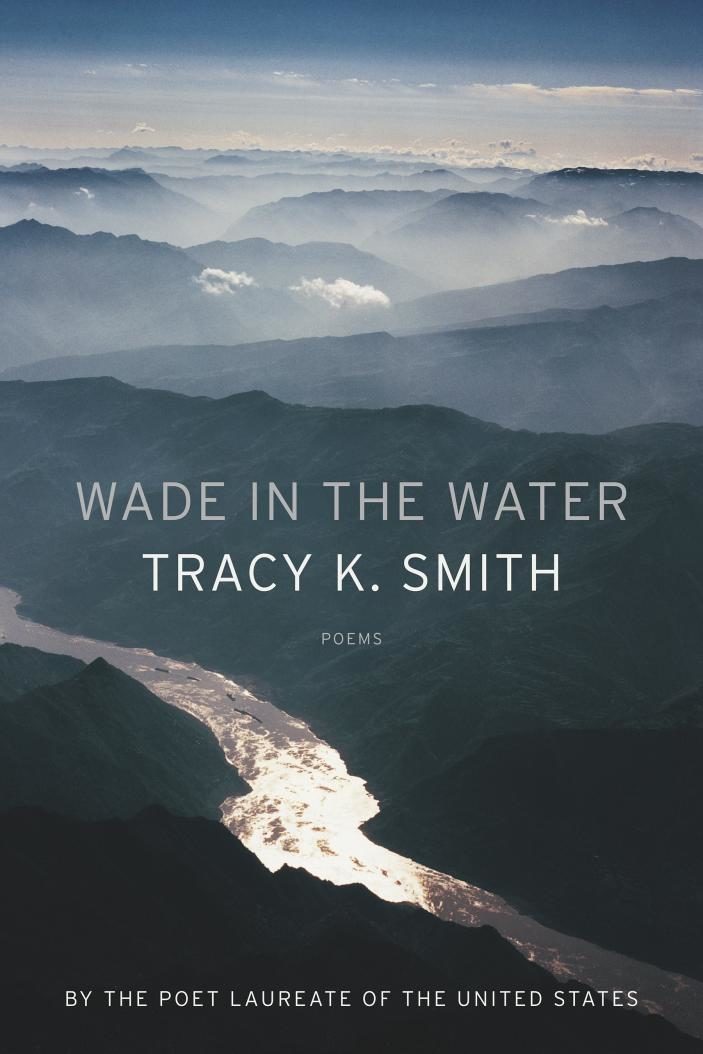Wade in the Water
by Tracy K. Smith
reviewed by Henry Hughes
Tracy K. Smith’s fourth book of poetry ends with “An Old Story” of terrible times. Echoing Yeats’s “The Second Coming,” Smith bemoans a ravaged land and rising hate—the “worst in us having taken over / And broken the rest utterly down.” But after scraping rock bottom, the beast that wakes is hope.
[ … ] —something
Large and old awoke. And then our singing
Brought on a different manner of weather.
The earth survives, diversity survives, we survive: “We took new stock of one another. / We wept to be reminded of such color.” Should we believe these prophecies? We should certainly take notice when they arrive through such powerful poetry.
Smith’s hope is earned, however, through an unflinching look at history—the history of slavery, immigration, race, gender, and our sometimes wrenching psychic and social ordeals—warning us of misidentifications, and urging us to embrace the “stranger.” Smith writes of people who are made strange to us by the burial of time—black soldiers and their families during the American Civil War, held tenuously by their depositions and letters, which Smith revives and adapts into a series of haunting poems. She also turns up the lights on the world’s countless refugees in her poem “Theatrical Improvisation,” where America is a playhouse “dark and not half full,” experiencing brutalities and a “collective / Clenching in the chest.” There are also everyday moments when we sense angels presiding in biker gear, smelling of gasoline and rum, or, in “Hill Country,” God rumbling downhill in a Jeep to look around and slip back into the nature of his creation—or is it evolution?—where “he can almost believe / In something larger than himself rearranging / The air.” Then there are encounters, freed from the burden of history, where we find ourselves talking passionately to someone we’ve just met, as in “Driving to Ottowa”:
[ … ] The momentary kind
Of love two strangers share,
Pushing out those long sighs
And then rushing to fill the lungs
Again with weightless clear air.
The title poem, “Wade in the Water,” drawn from a slavery-era, “old blood-deep song / That dragged us to those banks” and dedicated to the Geechee Gullah Ring Shouters, celebrates art’s ability to overcome prejudice and estrangement on both personal and historical levels.
One of the women greeted me.
I love you, she said. She didn’t
Know me, but I believed her,
And a terrible new ache
Rolled over in my chest [ … ]
Smith describes the Ring Shouters’ performance about escaping slavery, which is both a recreation of an old emotion and an immediate expression of freedom, as like being in “a room where the drapes / Have been swept back,” where light frees the soul and “We could let ourselves feel, knew / To climb. O Woods—O Dogs— / O Tree—O Gun—O Girl, run—” The poet asks across time at the end of the poem, “O Lord— / Is this love the trouble you promised?”
Love and trouble run together in unexpected and sometimes unsolvable ways in Smith’s book. In “Dusk,” a brilliantly honest mother-daughter poem, we see the moment when a child becomes that “solid self-centered self” who would “trust no one but herself.” Many parents can identify with those painful moments, when
[ … ] even though we were together, her eyes
Would go half-dome, shades dropped
Like a screen at some cinema the old aren’t
Let into. I thought I’d have more time! I thought
My body would have taken longer going
About the inevitable feat of repelling her [ … ]
Strong-willed daughters and sisters stand throughout this collection, where they must endure and triumph in what is still “A Man’s World,” where
He will surely take it out when you’re alone
And let it dangle between you like a locket on a chain.
Like any world, it will flicker with lights that mean dwellings,
Traffic, a constellation of need.
Smith deconstructs the consequences of male knowledge and success in the history of civilization, leading us to current abuses in America, beginning right at the top.
In “Declaration,” an ingenious erasure poem revealed from that famous 1776 document, Smith, the poet laureate of the United States, calls out our president: “He has / sent hither swarms of Officers to harass our people / He has plundered our— / [ … ] destroyed the lives of our— / taking away our— / abolishing our most valuable—”
Poems imbued with social justice are notoriously susceptible to clichéd rhetoric and a lack of nuanced complexity—often they plunge deep as spoken word performances but run aground on the page. This is not the case with Tracy K. Smith, a true artist who never forsakes the language, rhythms, and masterful lineation of literary poetry. With densely imbricated metaphors and magazine-clear descriptions, subtle assonance and ringing end rhymes, measured ghazals and free range disquisitions, Wade in the Water offers diverse, exquisitely crafted poems that speak directly to our times.
Published on April 11, 2019

